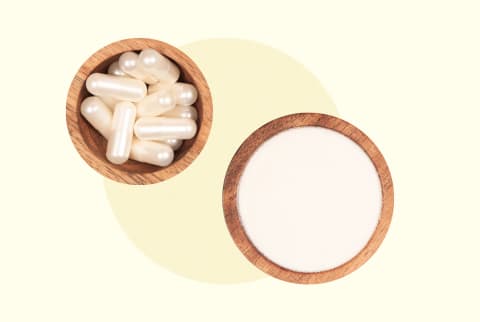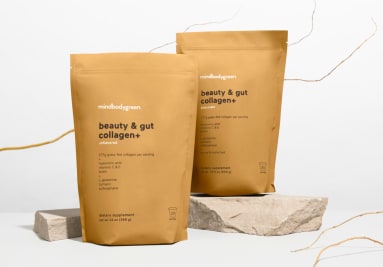What Are Collagen Peptides? The Benefits & How To Pick A Supplement



Collagen supplements are hailed as skin saviors by health and beauty experts alike. That doesn't mean, however, that there's still not some confusion surrounding the product. Take the phrase "collagen peptides": What does the term mean, what do they do, and what should you know before picking a supplement? Here, everything you need to know.
Advertisement
What are collagen peptides?
Often collagen supplements have "collagen peptides" on the label. The term peptides refers to short chains of amino acids. The main amino acids in collagen are glycine, proline, hydroxyproline, and arginine, all of which help our bodies remain in good health by providing the building blocks for hair, skin, muscles, and so on.*
Collagen is turned into collagen peptides through the process of hydrolysis (why you'll often hear these called "hydrolyzed collagen" or "collagen hydrolysate"). In order for our bodies to reap the benefits of collagen, it must be broken down into these amino acid chains so we can absorb it through our digestive tract and into the bloodstream.*
Essentially: If it's not hydrolyzed, it's not useful.
Summary
Advertisement
The different varieties of collagen peptides and why it matters:
There are many types of collagen1; each has a unique amino acid profile and serves different parts of the body. For instance, there are specific types of collagen responsible for forming your skin and cartilage.
Roughly 80 to 90% of collagen1 belongs to Type I, II, and III. Each has a different amino acid composition and thus serves different functions in the body. Type I2 is important for bone, teeth, and skin formation and is predominant in the tissue and tendons. Type II3 is mostly known for its role as structural support in cartilage. Type III4 is found in skin, muscle, and blood vessels.
Beyond the different types of collagen, it's important to note that there are two terms used to classify it.
First, endogenous collagen is natural collagen, or the kind that is synthesized by the body. Second, exogenous collagen is synthetic and comes from an external source, such as a powder. (So collagen supplements are made of exogenous collagen.) Endogenous collagen depletion is linked to a declining bill of health.
Collagen peptide benefits.
Here's what the research says so far:
Advertisement
Collagen benefits for skin and hair.*
In studies, collagen peptide supplements have been shown to support skin elasticity5 and overall hydration6.* "It can manage skin wrinkling, providing the skin one of its basic ingredients to stay firm and taut," says Taz Bhatia, M.D., an integrative medicine physician and mbg Collective member.*
The thought is that collagen plays a role in forming a cluster of cells, or fibroblasts, that allow new cells to grow while helping replace dead skin cells.* Fibroblasts are critical for skin health and wound healing.* Collagen has also been found to support accelerated hair growth and wound healing7, according to a study in the Journal of Investigative Dermatology.*
Topically, most collagen molecules are too large to be absorbed by the skin. Any immediate benefit from a topical collagen product is likely due to the moisturizing effects that don't actually increase or stimulate collagen production.
We also need vitamin C to synthesize collagen. So, while the jury is still out on all the hype about collagen skin care products, adding vitamin-C serums and oils to your routine may help naturally stimulate collagen production in the body.
Advertisement
Collagen benefits for the gut.*
In addition to skin, the gut gets a lot of attention when it comes to collagen. There is some evidence that amino acids in collagen, specifically glycine, may help manage GI inflammation for those with digestion conditions.*
Additionally, glutamine8, one of collagen's other amino acids, is key for managing gut inflammation and inhibiting oxidative stress of the intestines.*
Healthy collagen levels have been shown to help support proper gut acidity8, which may help manage painful heartburn and digestion issues.* It is also known that collagen is essential for supporting the intestinal wall.* In fact, collagen supplements may help support the stomach lining9, too, according to the journal Gastroenterology.*
On the flip side, research from the Journal of Clinical Pathology has found decreased collagen in those with digestive troubles, specifically, an association between IBS and diminished collagen levels10.
Collagen and joint and bone health.*
Collagen plays an important role in connective tissue functioning, meaning that healthy collagen levels are paramount to maintaining ideal body strength as we age.*
Some research from the International Journal of Medical Sciences has found that collagen may manage painful symptoms11 in those with joint conditions.* While the exact biological mechanism for how collagen supplementation supports joint pain remains unclear, scientists surmise that collagen may not really boost your endogenous collagen supply; rather, it promotes normal inflammatory processes, thereby managing the overall symptoms.*
Perhaps that's why William Cole, D.C., IFMCP, a functional medicine expert and mbg Collective member, says regarding his patients who take collagen supplements: "Not only do they notice their skin becoming brighter, nails becoming stronger, hair becoming more luminous, but they often experience less joint pain."*
Advertisement
How we lose collagen:
While collagen declines with age, many of our lifestyle choices can either deplete or preserve optimal levels. Here, the three main causes of declining collagen:
Sugar.
While skipping out on sugar has many general health benefits, sugar can weaken our strong collagen proteins. "High sugar levels can lead to hardening and fragmentation of collagen, weakening the skin foundation, and promoting premature skin aging," board-certified dermatologist Joshua Zeichner, M.D., says about inflammatory diets and collagen.
See, high sugar intake increases the rate of glycation12, forming these molecules known as AGEs that wreak havoc on and degrade other proteins. Over time, too much sugar can cause a weakening and depletion of collagen.
Sun damage.
If you love catching some UV rays from time to time, use sunblock and wear a hat. Collagen experiences rapid deterioration13 with repeated sun exposure, and one study found that there was a "significant decrease" in collagen structure14 after exposing it to UV light.
Smoke.
Chemicals in tobacco smoke are known to damage elastin and collagen. "Smoking decreases the amount of oxygen delivered to tissues.
Therefore, tissue cannot regenerate and is more likely to become damaged and die," board-certified dermatologist Gary Goldenberg, M.D., previously told mbg about the relationship between smoke and collagen.
(See here for even more reasons collagen can decline.)
What to know about picking a collagen supplement:
While the above habits deplete collagen, don't fret! There are many ways to ensure that you're in good health through solid nutrition and supplementation. Food high in proline, vitamin C, vitamin A, and anthocyanidins can support collagen formation, according to a systematic review in the journal Frontiers in Bioscience.
Of course, there's also collagen powder. But not all collagen peptide proteins are created equal. Grass-fed bovine collagen contains both collagen Type I and III, making it the most effective choice for full-body benefits, including skin, gut, and bone health.*
Be sure to look for a brand that uses third-party testing and that has been branded clear of any potential contamination, like heavy metal toxicity. Especially because most collagen comes from animal parts, it's important to check that you're buying from a high-quality and reputable source that only uses grass-fed options.
FAQ's.
Below, find some of the most commonly asked questions about collagen peptides.
What are collagen peptides again?
Let's review: The term peptides refers to short chains of amino acids, and they're are created through the process of hydrolysis. So when you ingest hydrolyzed collagen supplements, you're ingesting collagen peptides, primarily glycine, proline, hydroxyproline, and arginine.
What are the side effects of taking collagen?
With hydrolized bovine collagen, there aren't many side effects to note, as the smaller bits of protein are easier for your body to digest and absorb (as opposed to gelatins, which has a larger particle size and can cause bloating in some people).
However, you want to make sure you're seek out a supplement from a reputable company with third-party verifications on the label, just to make sure there aren't any contaminants. Grass-fed, pasture-raised is the way to go, as it's derived from cows raised in strict standards—which ensures better quality.
Of course, if you have a beef allergy, you'll want to steer clear. And if you're taking any medications, it's best to consult your primary care doctor to make sure taking collagen won't interfere.
Is it OK to take collagen peptides daily?
According to a study found in the peer-reviewed journal, Nutrients, taking 2.5 to 15 grams of collagen peptides per day15 should be safe and effective. So, yes, it should be fine to take collagen peptides daily—in other research studies, like this one about nail health16, participants took collagen every day for 24 weeks before scientists took note of the benefits.
Still, you should speak to your doctor if you have any concerns about taking collagen daily, or at all, for that matter.
When should I take collagen, morning or night?
There are tons of claims out there—some say you should take it in the morning on an empty stomach; others believe you should take it at night so your body processes it during the REM cycle. The answer? There's no strong evidence to suggest you need to take collagen at a particular time. (See here for all the research we have on the topic.)
Rather, stick to a schedule that's most convenient for you. If you're looking to make collagen supplements part of your daily routine, it helps to choose to a time you'll actually stick to.
The bottom line.
Collagen is vital for overall health—which is why collagen supplementation has become so popular. However, for your body to actually be able to utilize this supplement, it must first be broken down into collagen peptides. These are simply short chains of amino acids that are easily absorbed by the body. Once your body absorbs them, it can use the amino acids to promote skin, joint, muscle, and gut health.

Leigh Winters is a neuroscientist, psychologist and natural beauty expert. She received her M.S. in Neuroscience and her M.A. in Clinical Psychology from Columbia University. She is the founder and CEO of Leigh Winters Beauty, and has previously contributed to NBC News, Allure, Health, and Shape, and worked as a researcher at Columbia University’s Spirituality Mind Body Institute researching mindfulness and biobehavioral health.
16 Sources
- https://www.ncbi.nlm.nih.gov/books/NBK21582/
- https://www.sciencedirect.com/topics/biochemistry-genetics-and-molecular-biology/type-i-collagen
- https://www.sciencedirect.com/topics/biochemistry-genetics-and-molecular-biology/type-ii-collagen
- https://www.sciencedirect.com/topics/neuroscience/collagen-type-3
- https://www.ncbi.nlm.nih.gov/pubmed/23949208
- https://www.ncbi.nlm.nih.gov/pubmed/26362110
- https://www.ncbi.nlm.nih.gov/pubmed/25989472
- https://www.ncbi.nlm.nih.gov/pubmed/25368996
- https://www.ncbi.nlm.nih.gov/pubmed/3792777
- https://www.ncbi.nlm.nih.gov/pubmed/14600124
- https://www.ncbi.nlm.nih.gov/pmc/articles/PMC2764342/
- https://www.ncbi.nlm.nih.gov/pmc/articles/PMC4648888/
- https://www.ncbi.nlm.nih.gov/pmc/articles/PMC1606623/
- https://www.ncbi.nlm.nih.gov/pmc/articles/PMC3299808/
- https://pubmed.ncbi.nlm.nih.gov/31096622/
- https://pubmed.ncbi.nlm.nih.gov/28786550/

